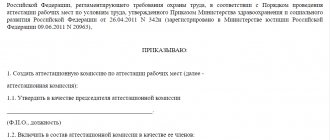What does this mean and what should be paid?
The legislator gives the subordinate and the employer the right to terminate the official relationship by concluding a certain agreement.
This possibility is established by Article 78 of the Labor Code of the Russian Federation. This type of dismissal is optimal, for example, if the relationship between the parties to the service contract does not work out.
The law does not prescribe a clear procedure for terminating the legal relationship of the parties on this basis; however, upon dismissal, the employee retains all the rights that the Labor Code provides him , including the right to receive payments and compensation.
A distinctive feature of dismissal in accordance with Article 78 of the Labor Code of the Russian Federation is the absence of the need for two-week work, which is expected upon termination of an official relationship, initiated by an employee.
The initiator of termination of an employment contract by agreement of the parties can be either the employee or the employer.
Article 140 of the Labor Code of the Russian Federation imperatively orders the employer to make a final settlement with him on the last day of work of the resigning employee, consisting of the following amounts:
- wages for the period worked;
- compensation for unused vacation days (if any);
- compensation for termination of an employment contract by agreement of the parties, provided that such payments are provided for by local regulations in force in the company.
The legislator does not establish the amount of compensation; accordingly, it is determined by the collective agreement or other local documents in force at the enterprise. In addition, the employer and the dismissed employee can agree on the amount independently.
Typically, the amount of compensation is equal to the amount of compensation payments due to an employee upon termination of employment relations due to a reduction in the number or staff of the enterprise, that is, the average salary of the employee is paid for 3 months.
Payment of compensation is made only if such an obligation of the employer is established by local acts of the enterprise. Otherwise, the company management may refuse payments.
The amount paid must be specified in the termination agreement, which is signed by both the employee and the employer.
The initiative of one of the parties cannot serve as a reason for terminating the dismissal agreement; such a desire must come from both the employer and the subordinate employee. This provision is enshrined in paragraph 20 of the Resolution of the Plenum of the Supreme Court of the Russian Federation No. 2 of March 17, 2004 “On the application by the courts of the Russian Federation of the Labor Code of the Russian Federation.”
It should be borne in mind that upon termination of a working relationship, the law obliges the employer to pay compensation to the employee for unused vacation days. Moreover, if the contract is terminated before the end of the year for which he has already been granted vacation, the paid vacation pay must be withheld from the employee based on the time that he actually worked.
What kind of compensation should I ask for?
The amount of compensation is not specified in the law. She can be anyone! Its size may be specified in a collective agreement or local regulation. The main condition is that the employee and employer can agree. As a rule, the amount of compensation is no less than for dismissal due to staff reduction - a maximum of 3 average employee salaries. This is what HR practice shows. The employee has the right to ask for more, the employer has the right to offer less.
The employer is obliged to pay compensation only if it is stipulated in the regulations of the enterprise. In all other cases, it is his right! The amount of compensation is specified in the agreement, which is signed by both parties. Only in this case will the employee be able to sue if the employer violates the terms of termination of the employment contract, according to this document.
Such an agreement cannot be terminated by one of the parties; its cancellation requires the desire of two participants in the labor relationship: the employee (employee) and the employer - clause 20 of the Resolution of the Plenum of the Supreme Court of the Russian Federation No. 2 of March 17, 2004.
Pros and cons of the procedure for an employee
Dismissal by agreement of the parties has a number of benefits for the employee, including:
- the ability to independently initiate termination of legal relations;
- no need to indicate the reason for dismissal;
- the ability to terminate the employment contract at any time without working 2 weeks, mandatory for voluntary dismissal;
- the ability to terminate relations with the employer even during periods in which the law directly prohibits this (during vacation or sick leave);
- the ability to propose your own conditions for terminating the employment agreement;
- no negative consequences for the employee’s reputation;
- the opportunity to use this basis instead of dismissal at the initiative of the employer in connection with the guilty actions of the employee.
As for the negative aspects associated with the termination of relationships under Article 78 of the Labor Code of the Russian Federation, they are as follows:
- the impossibility of unilaterally refusing to fulfill the terms of the agreement;
- in the absence of control of the employer by the trade union body;
- in the absence of the obligation of the enterprise management to pay compensation, unless this is expressly stated in the local regulations of the employer or the parties have not reached mutual agreement on this issue.
Despite the fact that unilateral refusal to execute an agreement to terminate an employment contract is not allowed, an exception is made for women who, after signing it, learned about their pregnancy and therefore wished to cancel it. This position was taken by the Supreme Court of the Russian Federation in ruling No. 18-KG 16–45 of June 20, 2016.
Dismissal of an employee on the basis of Article 78 of the Labor Code of the Russian Federation also has advantages for the employer, including due to:
- simple procedure for termination of employment relations;
- no need to request a reasoned opinion from a trade union organization;
- the ability to terminate the contract on mutually beneficial terms;
- the ability to fire an employee with whom the relationship does not work out;
- the difficulty of challenging such dismissal in court.
What is dismissal by agreement of the parties?
The relationship between an employee and an employer is established in an employment contract. A contract can be terminated in different ways by the Labor Code of the Russian Federation Article 77. General grounds for termination of an employment contract:
- At the initiative of the employee - the so-called dismissal at his own request.
- At the initiative of the employer. It’s not that it’s impossible to do this, but it’s quite difficult. The employee must have committed some serious violation. For example, skipping work without a good reason.
- When a position is reduced.
- Under circumstances beyond the control of the parties. Let’s say a court verdict has come into force that prohibits an employee from holding this position.
- By agreement of the parties. This method involves the employee and the employer agreeing on the terms under which the employee agrees to leave the position. Usually these are additional cash payments.
To understand why an agreement between the parties is needed, let’s consider common cases in which it is used:
- The employee copes extremely poorly with his duties and is generally useless to the company. But formally he complies with the terms of the employment contract. So it is impossible to fire him under the article. Therefore, the employer is ready to pay him just to get rid of him.
- An employee takes up a vacant position that needed to be vacated for someone else. The reason is very doubtful, but it would be strange to pretend that this does not happen.
- The company is undergoing a reorganization. And it is much easier to formalize dismissal by agreement of the parties than layoffs.
That is, for the employer it is an opportunity to quickly and easily get rid of an employee. And for the employee - to receive compensation for the fact that he loses his job without objective reasons.
Causes
The parties may come to the conclusion that it is necessary to terminate the contract based on an agreement for various reasons.
When drawing up an agreement, an employee may be guided by:
- the desire to receive compensation payments related to dismissal and provided for by local regulations (especially relevant when terminating contracts with company managers);
- the opportunity to avoid dismissal on negative grounds in connection with the commission of a disciplinary offense;
- the current negative environment in the workplace, which is difficult to prove.
The reasons prompting an employer to formalize the termination of employment relations with an employee by mutual agreement may be the need to:
- dismiss him as soon as possible;
- dismiss an employee with whom there is no working relationship;
- dismiss an employee whose contract cannot be terminated on other grounds.
Also, the reason for dismissal by agreement of the parties on the part of the employer may be the reluctance to carry out organizational and staffing measures and dismiss employees due to staff reduction.
If a dismissed employee decides to go to regulatory authorities or court, and during the verification process the fact of layoff is confirmed, he will be entitled to additional payments, and the employer may be fined.
Reasons for dismissal and advantages of such grounds for dismissal
Reasons prompting an employee to leave the employer:
- by article (for example, absenteeism);
- the likelihood of receiving “compensation” from the employer (beneficial for women on unpaid “children’s” leave);
- the need to go to another job, but there is no time to work out the allotted time.
Reasons that prompt an employer to fire an employee:
- the need to terminate the employment relationship with an unwanted employee;
- the need to dismiss employees who cannot be dismissed for other reasons (pregnant women on sick leave, students, workers on vacation).
Benefits for the employer:
- there is no need to consult and notify the union of the proposed dismissal;
- the employee with whom the agreement has been drawn up can be fired in any case, since changing the decision on the part of the employee himself is not possible without the consent of the organization.
When concluding an agreement, it must be taken into account that the employee has the right to challenge it in court, arguing his position by pressure from the employer, especially when it comes to workers in the most vulnerable categories who were dismissed without monetary compensation.
Employee rights
An employee who wishes to terminate the employment relationship on the basis of Article 78 of the Labor Code of the Russian Federation has the following rights:
- terminate the employment contract at any time without working 2 weeks, which are assumed upon dismissal of one’s own free will;
- terminate relations with the employer, including during vacation or while on sick leave;
- do not indicate the reason that prompted him to sign the agreement;
- receive compensation (if this is provided for by the agreement itself or by local regulations of the enterprise);
- offer the employer favorable conditions for terminating the contract;
- use this basis as an alternative to terminating the relationship due to guilty actions.
It is possible to terminate an employment contract on this basis with any employee, including those who are granted certain benefits by law (for example, pregnant women, persons raising children under 3 years of age, etc. cannot be dismissed at the employer’s initiative). However, as stated above, women who, after signing the agreement, find out about their pregnancy, have the right to refuse its execution unilaterally.
Sample and contents of the agreement
It should contain the following information:
- mutual content of the parties;
- details of the employment contract that needs to be terminated;
- date of termination of employment, that is, the date of the last working day;
- the amount and terms of payment of monetary compensation to the employee, if provided;
- date and place of his imprisonment. Without this information, the document will be considered void;
- position and full name of the employee;
- full name of the employer indicating the organizational and legal form;
- position and full name of the person who represents the interests of the employer and has the authority to sign documents;
- passport details of the dismissed employee;
- employer's tax identification number;
- Signatures with transcripts.
The agreement is signed by both parties. The document can provide for monetary payment of compensation to the employee for termination of the contract (compensation for dismissal by agreement is not a mandatory condition for such termination of the contract).
How to quit correctly: step-by-step instructions
Dismissal by agreement of the parties will be legal only if the employer and employee have agreed on all issues related to the termination of employment relations.
That is, initially an employee or head of the company must come up with an appropriate initiative.
The legislator does not oblige the employee to work for any period after the decision to terminate the contract is made on the basis of Article 78 of the Labor Code of the Russian Federation; accordingly, the day on which the relationship between the parties will be terminated must be indicated in the document itself.
If a collective agreement adopted by an enterprise, regulations on wages or other local acts provide for compensation in connection with dismissal by mutual agreement of the parties, then the employer is obliged to pay it.
In the event that such an obligation is not established, the parties themselves can agree on the payment of compensation. The legislator does not stipulate its size; accordingly, it can be anything, the main thing is that the employee and the employer agree.
If the employer does not agree to compensation payments, and the employees’ right to receive them, as it should be, is not enshrined in the regulatory documentation of the enterprise, then it is impossible to resign with payments and force the employer to do so.
Since the employer can initiate termination of the contract, the employee has the right to independently decide whether he should resign by agreement of the parties. Quite often, this option is beneficial to the subordinate himself no less than to the employer.
How to fire at the initiative of an employee or employer?
The legislation provides for the following procedure for dismissal on the basis of Article 78 of the Labor Code of the Russian Federation:
- First of all, one of the parties to the labor relationship must contact the other with an initiative to terminate it.
In this case, the employee is required to write a letter of resignation by agreement of the parties. The employer approaches the subordinate with a memo in which he proposes to terminate the contract. Since mutual consent is a prerequisite for dismissal under Article 78 of the Labor Code of the Russian Federation, it must be confirmed in writing. This can be either a response letter or a consent mark affixed to the original document, dated and signed by the other party. - Then the parties draw up the agreement itself, including the terms acceptable to them.
- After its conclusion, all changes to the document must be made in writing.
- On the day specified in the agreement, the employer issues a dismissal order. At the same time, the law allows the use of both a unified order form (T-8) and one developed in the company.
- The Labor Code requires the employee to familiarize himself with the order in writing. The fact of familiarization is confirmed by his signature. The entry in the work book must contain paragraph 1 of part 1 of Article 77 of the Labor Code of the Russian Federation as the basis for termination of the contract.
- On the last day of work, the employee must receive all payments due to him and a work book.
Since in this case the subordinate and the employer independently come to agreement on all fundamental issues, any additional notification to the dismissed person other than what is specified in paragraph 1 is not required.
The rules for formalizing the termination of legal relations require the indication in the work book as the basis for dismissal of paragraph 1 of part 1 of Article 77 of the Labor Code of the Russian Federation.
A written request for termination of a contract, provided that the initiative comes from the employee, must contain the following information:
- last name, first name and patronymic, as well as the position of the subordinate and head of the enterprise;
- proposal to terminate the contract;
- indication as the basis for the termination of the relationship between the parties of Article 78 or paragraph 1 of part 1 of Article 77 of the Labor Code of the Russian Federation;
- number and date of the current contract under which the person performs the labor function;
- expected date of termination of legal relations between the parties;
- request for compensation;
- date of;
- employee signature and its transcript.
The termination agreement will be an annex to the service contract. Until agreement is reached on all fundamental issues, the parties may not sign it. In the future, you can draw up a new text of the agreement or make changes to an existing document with reference to the protocol of disagreements signed by the subordinate and the employer.
Procedure of the parties
When using an agreement between the parties as a basis for dismissal, it is important to follow the procedure within the framework of the law. The Labor Code of the Russian Federation in 2017 does not allow coercion in the liquidation of mutual obligations, but it is used quite often. If management intends to simplify or conceal staff reductions, the views of employees should still be taken into account, since in the event of a collective complaint being filed in court, the chances of a positive outcome for employees are significantly increased. In this case, you will still have to initiate a layoff procedure in accordance with the law, but you will also have to spend money on employee compensation and legal costs.
The legislator has not provided mandatory rules regarding the procedure for dismissal by mutual agreement of the parties. Participants in labor relations act according to the following algorithm:
- The employee or owner initiates the dismissal procedure by agreement of the parties. Despite the fact that concluding an agreement requires the will of both participants, in most cases one person makes a proposal. The second party agrees or adjusts the terms of dismissal.
- Negotiations are held and the parties reach a consensus regarding the terms and date of dismissal.
- The agreements reached are reflected in the text of the agreement. Participants put their signatures.
- The management of the enterprise issues a dismissal order, which reflects the basis with reference to Art. Labor Code of the Russian Federation.
- The parties fulfill their obligations if their nature involves taking actions before dismissal.
- On the designated day, the fact of termination of the contract is confirmed by an entry in the employee’s work book.
- The management of the enterprise pays the employee in full.
- The work book is handed over to the employee.
The dismissal procedure by agreement of the parties can be changed depending on the circumstances and position held by the employee.
What documents must be provided upon settlement?
On the last day of work, the employee must receive from the employer:
- labor record with the corresponding entry made in it;
- certificate form 2-NDFL;
- a certificate of the amount of earnings for the two previous years for calculating sick leave and maternity leave;
- information on insurance contributions for pension insurance.
According to Art. 84.1 and Art. 62 of the Labor Code of the Russian Federation, an employee can also request from the employer a copy of the dismissal order and other documents about work.
Paperwork
IMPORTANT : 2 weeks before the proposed dismissal, the employee must write a statement. There is no established form for such a document, so it is drawn up in free form. You can also use a proprietary sample developed by the company
.
"Cap" consists:
- company name;
- position and full name of the director;
- Full name and position of the employee.
The title of the document is written in the middle, and then on a new line the employee’s request for dismissal and the date.
Example:
To the General Director of Spirit LLC
Prokofiev I.I. from
Accountant
Ivanova Maria Petrovna
Statement
I ask you to dismiss me by agreement of the parties from November 15, 2020 (according to Article 77 clause 1 of the Labor Code of the Russian Federation).
Ivanova M.P. signature 10/30/2017
What should the employer give?
A work book in which the corresponding entry is made and the employee’s signature.- Document on the amount of funds paid to the Pension Fund (SZV-M or RSV-1).
- Document on average earnings (for example, for the employment service).
- Certificate of form 182n for calculating sick leave with data on wages for the last 24 months.
- A document that records the employee’s length of service (SZV-STAZH).
- Copies of other internal documents at the employee’s request.
To summarize, it can be noted that the process of dismissal by agreement of the parties is quite simple. The main thing is to clearly know all the stages and accompanying documentation.
How to formalize termination of a contract?
The end of the labor relationship of the parties is confirmed by a dismissal order issued by the director of the company, in which clause 1 of part 1 of Article 77 of the Labor Code of the Russian Federation must be indicated as the basis for termination of the contract. The dismissed subordinate signs the order, confirming the fact of familiarization with it.
The employer may indicate in the work book:
- dismissed by agreement of the parties on the basis of clause 1, part 1, art. 77 Labor Code of the Russian Federation;
- the employment contract was terminated by agreement of the parties on the basis of clause 1, part 1, art. 77 Labor Code of the Russian Federation.
Good aspects of the agreement between the parties for the employee
A resigning employee should consider the agreement of the parties as a reason for dismissal, because:
- the application can be submitted at any time during the term of the employment contract;
- the reason for leaving is not required in the application;
- the moment of leaving is discussed with the employer, there is no mandatory service;
- you can agree with the employer on the conditions of care – terms, compensation, etc.;
- neutral entry in the work book;
- an excellent alternative in case of threat of dismissal for guilty behavior;
- the length of service is not interrupted for another month after leaving on this basis;
- When registering with the Employment Center, the benefit will be higher.
How can you refuse?
Due to the fact that termination of the contract on the basis of Article 78 of the Labor Code of the Russian Federation presupposes that the subordinate and the employer reach an agreement on mutually beneficial conditions, after signing the dismissal agreement, it is impossible to unilaterally refuse to execute it.
However, the parties have the right to agree to cancel the document. Such an agreement must be mutual and documented in writing.
Refusal to execute a document on termination of work on the basis of Article 78 of the Labor Code of the Russian Federation is possible only for women who, after its execution, learned about their situation.
Order based on the results
Regardless of the content of the papers on consent to terminate the service contract, actual dismissal and settlement are made on the basis of an order for the main activity. As a rule, this is a standard unified form T-8 (detailed instructions on filling out the form can be read in the article “Sample dismissal order”). However, in the case of the first person of the company, the order can be signed by the owner of the organization, since the general director will have to negotiate not with himself, but with the highest management body of the organization - the owners. You can read more about the relationship between appointed and elected top officials of organizations and the owners of the company in the article “Employment contract with the director.”
Dismissal of the general director by agreement of the parties, sample
Order on dismissal of the first person in free form
What is the notice period?
The law does not provide for any time period within which the parties must notify each other of their intention to terminate an existing contract. The date of termination of the employment relationship is indicated in the dismissal agreement itself.
In certain cases, it is easier for a subordinate and an employer to come to an agreement on the termination of employment relations in accordance with Article 78 of the Labor Code of the Russian Federation on mutually beneficial terms. When making such a decision, the risks of both parties to the legal relationship are minimized, and it is quite difficult to challenge the legality of such termination of the contract in court.










